- Home
- George R. R. Martin
Mississippi Roll Page 14
Mississippi Roll Read online
Page 14
“I take it you didn’t find anything untoward, Agent,” she told him. “I have the master keys. Which rooms did you need to see?”
Expressionless, Agent Lowell consulted his smartphone. “We’ll start on the texas deck,” he said. “Stateroom three.”
“Stateroom three?” Montaigne told him. “I’m afraid we have a steam leak in that room, and it’s closed.”
Lowell gave her a thin-lipped half smile. “A steam leak? That’s terribly convenient. I’ll still need to see it.”
Wilbur moved quickly away with Captain Montaigne’s “Follow me, then,” moving up to the texas deck and trusting that Montaigne would take a slower route up. Inside the stateroom, he went to the closed door of the adjoining room, allowing himself to appear to the refugees in the dark and packed interior, holding an index finger up to his lips. “You must be silent,” he said. “They’re coming…”
With that, he slipped back into the main room and thrust his hands into the wall where the lines to the ’scape pipes ran, closing his fingers around and into the delicious steam there. He let it fill him, relishing the heat that now ran through him like lifeblood. He went to the door of the stateroom and let himself remain there, the door bisecting his body, his head outside. He could see Montaigne and the trio of agents approaching. “I wouldn’t go in there,” Montaigne said. “The steam leak…”
“Strange, I don’t see a warning sign on the door,” Lowell answered.
“I haven’t had time yet, but as you can see, the door’s dripping from it,” the captain answered. She held up the ring of keys. “And, after all, it’s locked. A sign seems unnecessary.”
“Then unlock it, please, and step aside.”
Wilbur slipped back into the room. He allowed his arms, handless, to become visible as the door opened, as if they were wisps of steam. He placed himself at the open doorway as Captain Montaigne moved away and Lowell took a step inside. Wilbur pressed his body against the man, gratified when the agent nearly jumped backwards. “Christ! It’s scalding in there,” he gasped. The front of his suit was spattered with water drops.
“It’s a steam leak,” Montaigne said, as if she were speaking to a child. “Steam is hot by definition.”
“Aren’t you afraid of fire?” Lowell asked her.
Montaigne laughed. “It’s steam. Steam is also wet. I’m far more worried about water damage to the stateroom. Look at your suit, and you already saw that the door’s sweating with it.” She said that with a glance into the room herself. “We’ll have the line sealed off as soon as possible. But as you can see, there’s no one there. If you still want to go in and search…” Montaigne let the sentence hang unfinished.
Lowell scowled. He pulled out his smartphone and looked at the screen again. “You have another stateroom on this deck—the one you reserve for shareholders. I need to see that one.”
“It’s currently occupied. Mr. Kirby Jackson, the primary shareholder, came aboard at Baton Rouge.”
“Fine. I’ll still need to see it,” Lowell told her.
Captain Montaigne shrugged. “As you wish.” With a final glance inside the room, as if she was looking for Wilbur, she pulled the door closed. Wilbur heard the lock engage, and the muffled footsteps of the four moving away.
He slipped back into the adjoining room. “It’s safe,” he told Jyrgal and the others. “You can come out now. They’ll be gone soon, and after that, I’m sure JoHanna will come to get Bulat and Anara—their ride is waiting for them. Then she’ll escort some of you back to the other room again.” He started to leave, then stopped, looking again at Nurassyl. “Jyrgal, how do you say thank you in Kazakh?”
“Paxmet,” Jyrgal replied. Nurassyl nodded back to Wilbur with a smile.
Wilbur pointed to his mouth, still looking at Nurassyl. “Paxmet, Nurassyl,” he said, then, turning to Jyrgal again: “Tell Nurassyl that without his help, this wouldn’t have ended well.” Wilbur inclined his head to Nurassyl as Jyrgal began to speak to his son in their own language.
With that, Wilbur went to stand in the bathroom tub for several minutes, allowing himself to cool and for the resulting water to drain away as the Kazakhs began to collect their belongings and move them back into the outer room.
Wilbur watched from the main deck as the Reverend Wintergreen, in his wheelchair, left the Natchez. JoHanna and Jack and two of the Kazakhs, accompanied him. The ICE agents had left hours earlier, at which point Reverend Wintergreen had come aboard, and many of the passengers had left for the local bars, shops, and sights. A crowd of locals had also paid to come aboard the Natchez to tour the boat and be entertained in the lounge; it was eleven P.M. now, the Jokertown Boys had finished their show, and Captain Montaigne had made the announcement that all visitors must now disembark.
Wilbur watched Reverend Wintergreen’s wheelchair make its slow way down the gangway in the crowd toward his waiting van. The Kazakhs slipped into the van as Wintergreen’s driver opened the side door and brought the side lift out to get the reverend into the vehicle. The door closed, and they drove off along with the rest of the cars parked along Silver Street. No one seemed to be following them.
For the second time that day, Wilbur felt a distinct sense of satisfaction. He moved through the wall of the salon on the main deck and into the crew corridors.
Even in his bodily days, Wilbur had enjoyed spending time in the heat and noise of the boiler and engine rooms: to him, they were the beating heart chambers of the Natchez. It was here that he could feel her as if she were a living entity, breathing in fire and water and exhaling steam to drive herself forward against the river’s currents, its twists and turns and ever-changing mudbanks.
Now, it was the place where Wilbur felt most at home and returned to often, where he could most easily feed his addiction to the steam that made him come most fully alive. He almost sighed as he felt that warm, moist atmosphere surround him. He enjoyed watching Cottle (who Wilbur had privately nicknamed “Coddle” for the way he treated the machinery of the boat) fiddle with the pressure in the lines. The crew had been dismissed, since the Natchez was berthed for the night, and no steam was needed beyond what was already in the system. Wilbur expected to find himself alone. He was surprised to hear voices coming from near the entrance to the boiler room. He slid between the boilers toward the voices.
“… know what to do when the time comes.” The voice was familiar, and as Wilbur passed the boilers, he saw Kirby Jackson in his expensive suit, talking to Chief Engineer Cottle.
“I don’t know, sir,” Cottle answered. He took a sip from his ever-present coffee mug—Wilbur wondered how the man ever managed to sleep, since he went through several pots a day from the cheap Mr. Coffee machine in the crew mess.
“I know you, Travis.” Jackson’s voice was warm honey and gravel. “Look, my friend, either way things go, you’re out of a job once we get to Cincinnati. How easy was it for you to find this one, eh? I’m offering you your chance to retire in style. Why not take it?”
“But this—”
“Now, Travis,” Jackson interrupted. “I’ve told you what needs to be done. I expect you to do it. That’s best for both of us.”
“But…”
Jackson moved close to Cottle, who looked down into his coffee mug. Standing over the man, Jackson shook his head. “You understand how it has to be,” Jackson said, his voice darkening and going dangerously soft. “You can’t back out now. I simply can’t allow that. Do we understand each other?”
Cottle said nothing, only nodded once, not even looking up at Jackson.
“Good. I thought you’d see reason,” Jackson said, taking a step back and raising his voice. He patted Cottle’s shoulder. “Then you know what to do when the time comes. I’ll make sure everything’s set up on my end. You’ve made the right decision, Travis. You’re not going to regret it, I promise you.”
With another pat on the back, Jackson left the boiler room as Cottle took another long drag from his coffee mug. Wilbur went
to the boilers, still holding steam, and pulled in the warmth and energy there until he had enough steam within him to make himself visible if he wished. Enough steam to have a voice again.
An alarm wailed as pressure dropped in the lines, then went silent. By the door, Cottle cursed.
“This is my boat, Cottle,” Wilbur said, still marveling at the steamy, breathy voice that had been returned to him. A voice appropriate for a haint. “My boat.”
“Who’s there?” Cottle said loudly. “Who said that?” The engineer came around the boilers with a wrench raised in one hand and the coffee cup still in the other—bringing back memories of his own fight with Carpenter—but Wilbur was already moving away, passing through the walls of the boiler room and back out onto the main deck. There were a few passengers there, but Wilbur had cooled enough that he was only an errant wisp to them if they noticed him at all.
What had they been discussing? Wilbur wondered. What was it that Cottle didn’t want to do?
The next morning, the Natchez left Natchez, heading to Vicksburg and the cities farther upriver.
It was one of Wilbur’s realizations, very quickly after his death, that he had no need of sleep. During the night, he might lean undisturbed on the railing of the hurricane deck and watch a moonlit landscape drift past the Natchez. That landscape had changed a lot over the decades, and especially during the day, the river was more crowded now with motorized small boats, pleasure cruisers, and barges carrying freight, but there was still a sense of being part of a long past while on the water.
His was an existence that was often solitary, but Wilbur also found that comforting. In those reflective moments, Wilbur could almost forget that he was also a prisoner here, marooned eternally on the Natchez. At least the Kazakh refugees stuck in their cabins would be able to leave, while Wilbur would remain here.
In the prison he’d constructed himself. He could bear that life sentence, though, as long as the Natchez still plied the river. As long as the steam was up. But on a Natchez that was no longer a boat, but just a floating bar or casino or hotel, never moving, without steam …
Living in Cincinnati until the Natchez rots … Jeremiah’s words. The prospect made Wilbur feel increasingly miserable the more he thought about it. He stood at the stern on the texas deck, watching the paddle wheel’s relentless churning, his thoughts running in circles in tandem with the paddles.
Selling the boilers for scrap. No steam. They’d run the calliope on compressed air like they do on the new boats. No steam, so no way for me to do much of anything. I’ll just be another haint they’ll talk about but never see, weak and emasculated. I’ll go crazy and bored. No steam: just endless days and nights tied up on an old wrecked hulk, with people eating dinners and wedding receptions with drunken idiots dancing to lousy bands playing worn-out music. Even if the owners did eventually decide to put her back on the river for little jaunts, the boilers would be gone. They wouldn’t go to the expense of putting new ones in. No. No steam. They’d just cram a diesel engine or two in the back, with the paddle wheel spinning strictly for show.
Just another replica excursion boat.
No steam. No steam. Just me stuck on a gutted boat, both of us rotting away together.
Without steam, Wilbur couldn’t make himself visible or shape his cloudy form. Without steam, he couldn’t handle or manipulate physical objects, no matter how light. Without steam, he couldn’t enter into another person’s body. Without steam, Wilbur was invisible, nothing at all. He was as addicted to steam as any heroin user to his drug.
If he thought it would work, Wilbur would have jumped over the railing and into the wheel and tried to drown himself, only he knew nothing at all would happen. He’d lost count of how many times he’d tried to leave the Natchez, but the boat (or whatever it was that had made Wilbur what he now was) wouldn’t allow that.
From the boiler deck, someone’s digital camera flashed, freezing for a moment the spray from the paddle wheel.
Eleanor and I stood here many times, just watching the paddle wheel endlessly turning and pushing us forward. “It’s mesmerizing,” she told him a few months after the Natchez’s launch, leaning over the rail to stare down. “Meditative. I feel like I could just let myself fall down into the paddle wheel and the water and just become part of the boat.”
That made Wilbur grab at her arm, as if he were afraid that she’d actually do that. “You wouldn’t be part of the boat, my dear,” Wilbur answered. “You’d just be dead.”
As if she understood his distress, she took a step back from the rail. She smiled at him. “Are you saying that our boat could possibly hurt me? I don’t think so. We built her. You built her, darling—you poured your heart and your soul into her. She’s your child and she loves us too much to hurt anyone in our family. I know you, my love. You’ll stay here until you die.” She laced her fingers around his. “Which is going to be a long, long time from now, for both of us…”
Wilbur was afraid now that Eleanor had been right, that it would be far longer than he wanted or expected. Death: he’d expected that experience to be like all the cliché books and movies. He’d see the light and all his dead relatives calling him and welcoming him into heaven.
But he’d stayed with the boat. His boat. But the Natchez was not his child. No. She clasped Wilbur to her bosom like an overprotective mother, refusing to let go.
What does it mean that I’m not … moving on to something else? Is that supposed to tell me that all that stuff about heaven and hell and the rest was a lie? Is this what happens to everyone who dies? Is the whole world full of ghosts stuck where they passed away, wearing what they were wearing in that moment and looking just like they did in the moment before death claimed them? Or did the wild card do this to me?
Either way, there’s no way out. At least, none that I’ve found.
A Chris-Craft Catalina went roaring past the Natchez, heading downriver, its wake throwing swells against the side of the steamer and causing the paddles to slap harder at the river, bringing Wilbur’s attention back to the wheelhouse. Being stuck on the Natchez was one thing when his steamboat still plied the river, still running the watery trail she’d followed since he’d built her. Having her docked and maimed and crippled, and him with her … that wasn’t a fate he could tolerate. There has to be a way for me to leave or to have the Natchez remain as she is. There must be—one way or the other. I have to find it.
But he had no idea even where to start.
He was still brooding on the problem later that night as he prowled the decks well before dawn. With the exception of some diehards in the lounge, most of the passengers were in their cabins, sleeping or pursuing other pleasures. Wilbur was glad for the solitude as he passed along the promenade of the boiler deck. At least, he was until he saw Kitty Strobe leaning on the rail near the stairs to the texas deck and staring at the night landscape passing by. The junior pilot was attired in her usual overdressed-for-the-weather fashion, with her sunglasses firmly in place despite the fact that it must be three or four in the morning. Wilbur figured she was on her way up to the pilothouse to relieve Jeremiah.
Wilbur made certain he was invisible; no sense in startling the woman, who appeared to be brooding about her own issues. He was about to glide past Kitty when they both heard voices approaching: the ghost-hunter trio, lugging equipment and camera, and talking to one another in loud stage whispers.
“You got the key that JoHanna chick gave us?” the blond one asked. He was handling most of the equipment, with a microphone on a long pole and various devices protruding from stuffed pockets in his baggy jeans—Sean, Wilbur remembered.
The dark-haired and tattooed leader of the trio—Ryan—held up a small key on a large ring. “Stateroom thirteen,” he said, not even trying for a whisper in the early-morning darkness. “Got it.”
“Thirteen? You sure?” his baseball-capped brother, Kevin, interjected. He had the camera. “Dude, I thought it was eighteen.”
“Thir
teen, I’m pretty sure,” Ryan said. “Anyway, it’s supposed to be one of the haunted rooms, and it’s empty right now. The captain said we could set up there until dawn. So let’s get…”
Ryan’s voice trailed off as he saw Kitty staring at them. “Hey, you’re one of the pilots, aren’t you,” he said.
“Yeah,” Kitty answered. “And you’re all awfully loud for this late.” Her voice was quiet enough that all three of the young men leaned in to listen. “You’re those Dead Report guys?”
“Yep, The Dead Report. You’ve seen our show?”
Kitty shook her head.
“You should. Great stuff. We’re getting quite a following. And we’re gonna get greater stuff on the Natchez. Hey, you know where stateroom thirteen is?”
He dangled the key in front of her sunglasses as Kitty lifted a finger to her lips. “Quiet, remember? Other side of the boat. This deck. And you gotta keep it down, okay?” The three of them nodded simultaneously. “You guys really believe in this ghost stuff? You think you can talk to dead people?”
“Hell yes,” Ryan answered excitedly, nearly shouting the words as Kitty shook her head. “Oh, yeah. Sorry,” Ryan continued, dropping his voice to a husky and still very audible whisper. “You should hear some of the recordings we got.” His hands waved like a conjurer doing a trick, exposing his tattooed arms. “Voices from beyond the grave,” he said theatrically. “On tape.”
Wilbur saw Kitty visibly shudder at that. “Whatever,” she said. “Just keep it quiet.”
“Sure will.” The trio moved on past Wilbur and Kitty. As they did, the boom Sean was carrying whacked into the metal railing of the stairs. The sound was like a blacksmith’s hammer on an anvil. Kitty glared at them as Sean grimaced. “Sorry,” he said. Kitty just shook her head again.

 A Dance with Dragons
A Dance with Dragons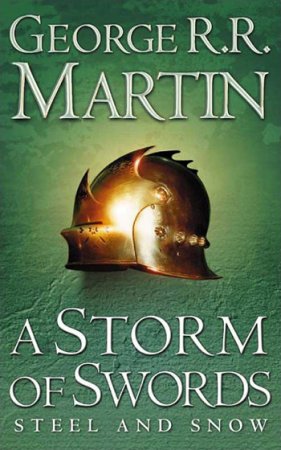 A Storm of Swords
A Storm of Swords A Feast for Crows
A Feast for Crows A Clash of Kings
A Clash of Kings A Game of Thrones
A Game of Thrones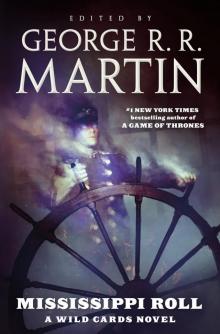 Mississippi Roll
Mississippi Roll Wild Cards V: Down and Dirty
Wild Cards V: Down and Dirty Busted Flush
Busted Flush When the Devil Drives
When the Devil Drives Dying of the Light
Dying of the Light The Ice Dragon
The Ice Dragon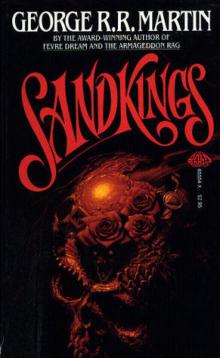 Sandkings
Sandkings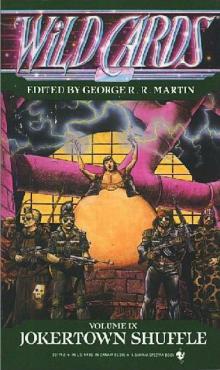 Jokertown Shuffle
Jokertown Shuffle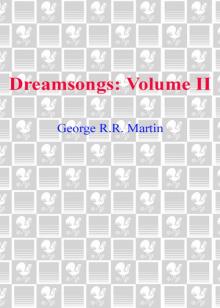 Dreamsongs. Volume II
Dreamsongs. Volume II Deuces Down
Deuces Down When We Were Heroes
When We Were Heroes Warriors
Warriors In the House of the Worm
In the House of the Worm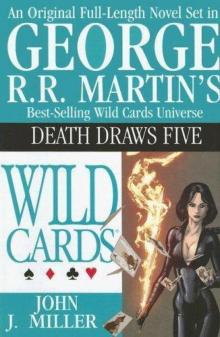 Death Draws Five
Death Draws Five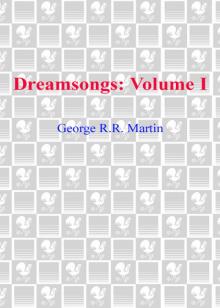 Dreamsongs. Volume I
Dreamsongs. Volume I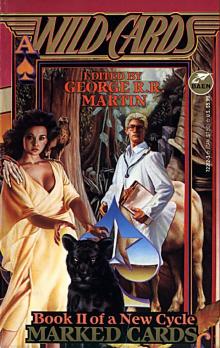 Marked Cards
Marked Cards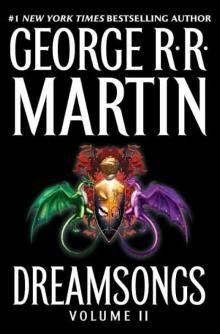 Dreamsongs
Dreamsongs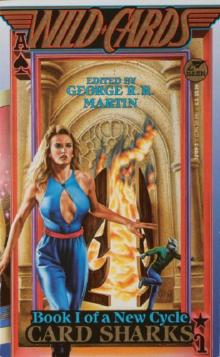 Card Sharks
Card Sharks Dangerous Women
Dangerous Women Inside Straight
Inside Straight Turn of the Cards
Turn of the Cards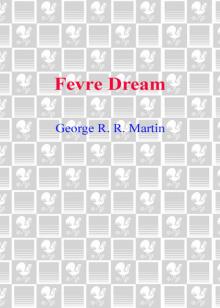 Fevre Dream
Fevre Dream High Stakes: A Wild Cards Novel
High Stakes: A Wild Cards Novel Windhaven
Windhaven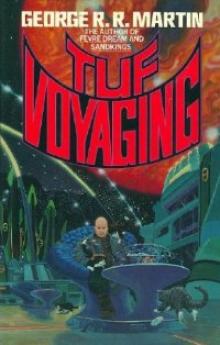 Tuf Voyaging
Tuf Voyaging Double Solitaire
Double Solitaire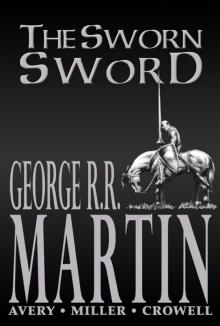 The Sworn Sword
The Sworn Sword Low Chicago
Low Chicago Dead Man's Hand
Dead Man's Hand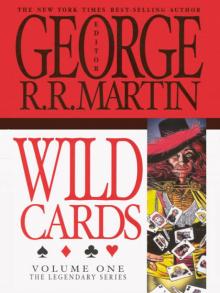 Wild Cards
Wild Cards Black Trump
Black Trump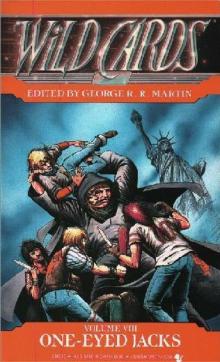 One Eyed Jacks
One Eyed Jacks Wild Cards: Aces Abroad
Wild Cards: Aces Abroad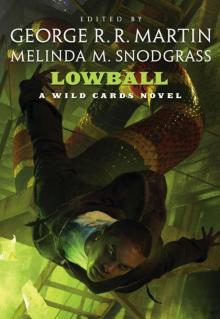 Lowball: A Wild Cards Novel
Lowball: A Wild Cards Novel Double Solitaire (2019 Edition)
Double Solitaire (2019 Edition) Dealer's Choice
Dealer's Choice Ace in the Hole
Ace in the Hole A Song for Lya: And Other Stories
A Song for Lya: And Other Stories Three Kings
Three Kings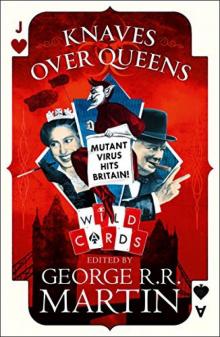 Knaves Over Queens
Knaves Over Queens Joker Moon
Joker Moon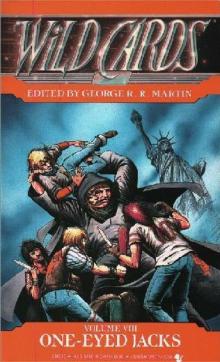 One Eyed Jacks wc-8
One Eyed Jacks wc-8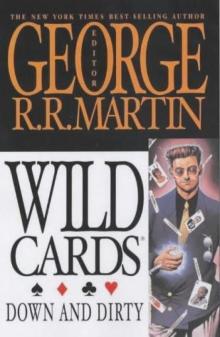 Down And Dirty wc-5
Down And Dirty wc-5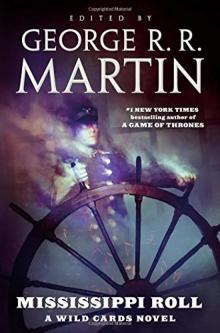 Mississippi Roll_A Wild Cards Novel
Mississippi Roll_A Wild Cards Novel A Feast for Dragons
A Feast for Dragons The Sworn Sword ttodae-2
The Sworn Sword ttodae-2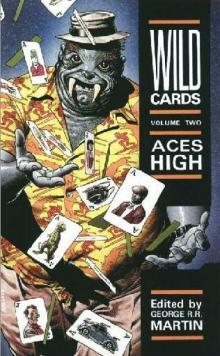 Aces High wc-2
Aces High wc-2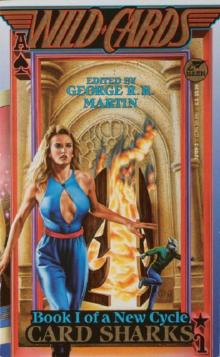 Wild Cards 13 : Card Sharks
Wild Cards 13 : Card Sharks Way of the Wizard
Way of the Wizard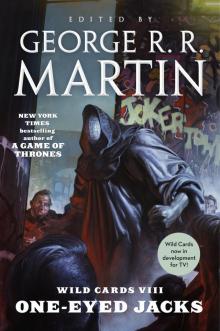 Wild Cards VIII: One-Eyed Jacks
Wild Cards VIII: One-Eyed Jacks A Dance With Dragons: Book 5 of A Song of Ice and Fire (Song of Ice & Fire 5)
A Dance With Dragons: Book 5 of A Song of Ice and Fire (Song of Ice & Fire 5) The Princess and The Queen, Or, The Blacks and The Greens (a song of ice and fire)
The Princess and The Queen, Or, The Blacks and The Greens (a song of ice and fire) Wild Cards VI--Ace in the Hole
Wild Cards VI--Ace in the Hole The World of Ice & Fire: The Untold History of Westeros and the Game of Thrones (A Song of Ice and Fire)
The World of Ice & Fire: The Untold History of Westeros and the Game of Thrones (A Song of Ice and Fire) The World of Ice & Fire: The Untold History of Westeros and the Game of Thrones
The World of Ice & Fire: The Untold History of Westeros and the Game of Thrones Busted Flush wc-19
Busted Flush wc-19 A Knight of the Seven Kingdoms
A Knight of the Seven Kingdoms Nightflyers: The Illustrated Edition
Nightflyers: The Illustrated Edition Wild Cards IV
Wild Cards IV Portraits of His Children
Portraits of His Children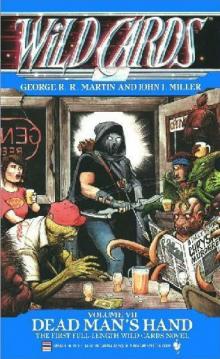 Dead Mans Hand wc-7
Dead Mans Hand wc-7 Jokers Wild wc-3
Jokers Wild wc-3 The Lonely Songs of Laren Dorr
The Lonely Songs of Laren Dorr Wild Cards III: Jokers Wild
Wild Cards III: Jokers Wild A Game of Thrones Enhanced Edition
A Game of Thrones Enhanced Edition Nightflyers & Other Stories
Nightflyers & Other Stories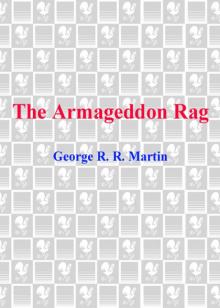 Armageddon Rag
Armageddon Rag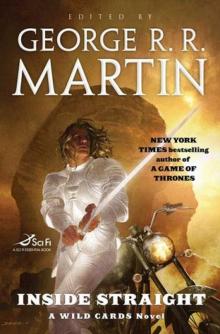 Wild Cards: Inside Straight
Wild Cards: Inside Straight A Song for Lya
A Song for Lya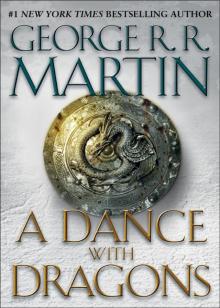 A Dance with Dragons: A Song of Ice and Fire: Book Five
A Dance with Dragons: A Song of Ice and Fire: Book Five Song of Fire & Ice 01 - A Game of Thrones
Song of Fire & Ice 01 - A Game of Thrones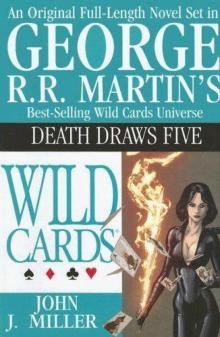 Death Draws Five wc-17
Death Draws Five wc-17 Turn of the Cards w-12
Turn of the Cards w-12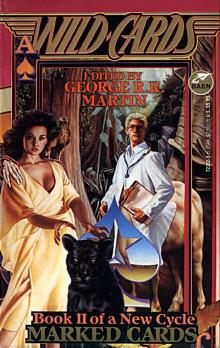 Wild Cards 14 - Marked Cards
Wild Cards 14 - Marked Cards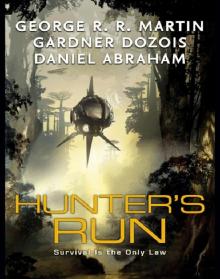 Hunter's Run
Hunter's Run The Glass Flower
The Glass Flower A Clash of Kings asoiaf-2
A Clash of Kings asoiaf-2 A Game of Thrones 5-Book Bundle: A Song of Ice and Fire Series: A Game of Thrones, A Clash of Kings, A Storm of Swords, A Feast for Crows, and A Dance with Dragons (Song of Ice & Fire)
A Game of Thrones 5-Book Bundle: A Song of Ice and Fire Series: A Game of Thrones, A Clash of Kings, A Storm of Swords, A Feast for Crows, and A Dance with Dragons (Song of Ice & Fire) Ace In The Hole wc-6
Ace In The Hole wc-6 Suicide Kings wc-20
Suicide Kings wc-20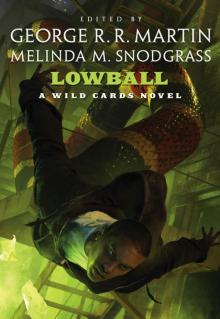 Lowball
Lowball Aces Abroad wc-4
Aces Abroad wc-4 George R. R. Martin's a Game of Thrones 4-Book Bundle
George R. R. Martin's a Game of Thrones 4-Book Bundle A Feast for Crows asoiaf-4
A Feast for Crows asoiaf-4 A Game of Thrones asoiaf-1
A Game of Thrones asoiaf-1 The Mystery Knight ttodae-3
The Mystery Knight ttodae-3 Double Solitaire w-10
Double Solitaire w-10 Wild Cards 15 - Black Trump
Wild Cards 15 - Black Trump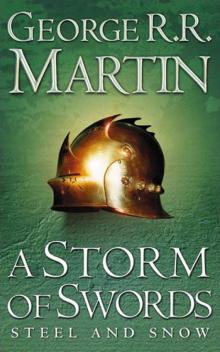 A Storm of Swords asoiaf-3
A Storm of Swords asoiaf-3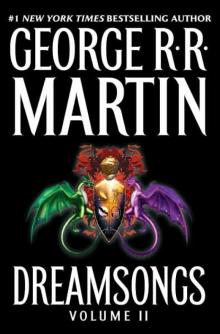 The Hedge Knight ttodae-1
The Hedge Knight ttodae-1 Dreamsongs 2-Book Bundle
Dreamsongs 2-Book Bundle The World of Ice & Fire
The World of Ice & Fire Starlady & Fast-Friend
Starlady & Fast-Friend Old Mars
Old Mars Fantasy For Good: A Charitable Anthology
Fantasy For Good: A Charitable Anthology Wild Cards V
Wild Cards V A Dance with Dragons asoiaf-5
A Dance with Dragons asoiaf-5 Dealer's Choice w-11
Dealer's Choice w-11 The Book of Magic
The Book of Magic A Game of Thrones 4-Book Bundle
A Game of Thrones 4-Book Bundle Texas Hold 'Em
Texas Hold 'Em Wildcards wc-1
Wildcards wc-1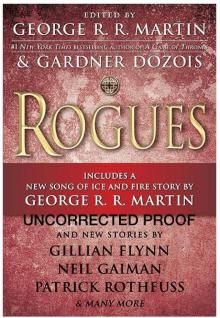 Rogues
Rogues Old Venus
Old Venus